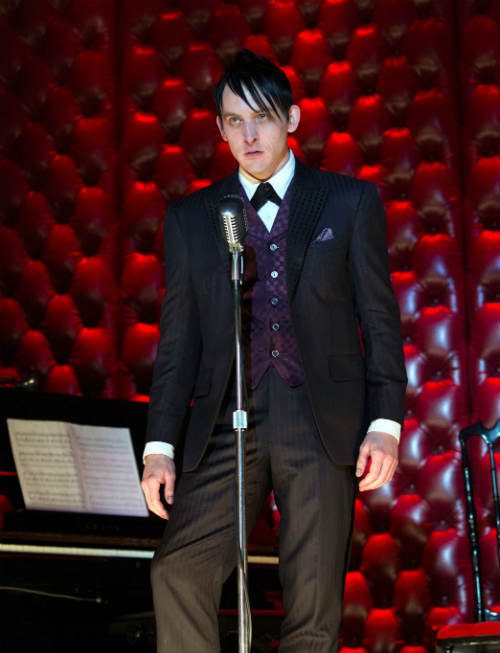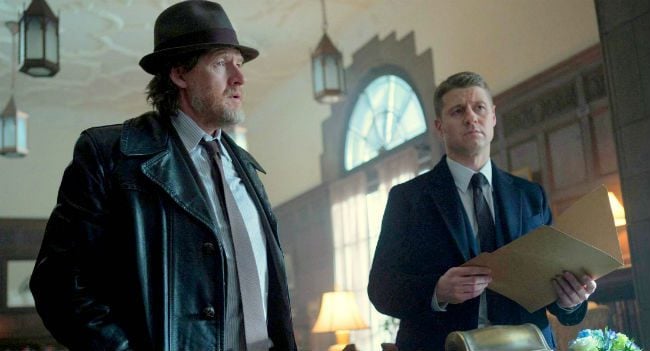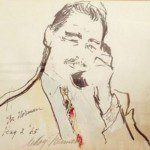There’s a reason why superhero tales resonate with audiences. They deal with huge issues — life, death, revenge, love, courage, cowardice and hate.
On Monday nights at 8 (ET), Fox offers “Gotham,” a Batman-prequel drama featuring the child Bruce Wayne (David Mazouz), a young (pre-Commissioner) Jim Gordon (Ben McKenzie), and both early versions of DC Comics villains and characters created just for the series.
Robin Lord Taylor plays the younger edition of comic villain Penguin — Oswald Cobblepot, first seen as an oddball, low-level henchman and general dogsbody for nightclub owner and crime mistress Maria Mercedes “Fish” Mooney, played by Jada Pinkett Smith (a character created just for the TV show).
Cobblepot faced death when crooked Gotham cop Harvey Bullock (Donal Logue) — another character created for the series — ordered his idealistic young partner, Detective Jim Gordon (Ben McKenzie), to shoot him, to prove his loyalty to Bullock’s crime-lord masters. Gordon managed to pull a fast one and spare Cobblepot’s life, propelling him into the waters of Gotham harbor with orders never to come back.
his idealistic young partner, Detective Jim Gordon (Ben McKenzie), to shoot him, to prove his loyalty to Bullock’s crime-lord masters. Gordon managed to pull a fast one and spare Cobblepot’s life, propelling him into the waters of Gotham harbor with orders never to come back.
But when Cobblepot emerged, barely alive, from the depths, he seized upon the identity of Penguin and set out on a mission to gain power and revenge himself on Mooney.
On the way, he has been brutal and ruthless — while being repeatedly brutalized himself. We don’t know anything about Cobblepot’s father, but he treats his equally eccentric mother (Carol Kane) with a combination of tenderness and disdain, and she dotes on him to excess.
In conversation with Taylor at a press event this January, we talked about Penguin and his mom, and Taylor said, “My favorite thing about this series is that we’re bringing humanity to these larger-than-life personas. Meeting the Penguin’s mother explains so much about him and makes him a real person.”
As for Cobblepot’s transformation into Penguin (which started as a cruel nickname), Taylor said, “It was really in the pilot, actually, the moment when he crawls out of the water and has been saved by the fisherman. Then he, unfortunately, murders the fisherman for the sandwich. I think that was him owning, just sort of embracing, the slur that he had been called for so long, embracing that and taking the power of that, refusing to ever be powerless again.
“That was the moment, for me at least, where he was, ‘You’re going to call me this? Then I’m going to be this. I’m going to show all of you that I’m not the powerless person you’re making, treating me as.”
Asked if Penguin still has a heart, Taylor said, “I think so. Definitely. Obviously, I think it’s damaged. The harshness that he’s faced, the bullying that he’s gone through as a child and also as an adult, being treated like a second-class citizen because of the way he looks.
“All of this, I think, has damaged him quite severely, but at the same time, I do think there is a shred of empathy inside of him. It’s filtered through this need not to be stepped on anymore, to not be powerless, to not be the bug that everyone’s mistreated in life. He’s just so beat up, though, all the time.”
Over the course of the season, Bullock’s corrupt side has been explored, along with his slow, halting march back toward self-respect; and Gordon has had to face the darker side of his own nature to gain enough influence to both save himself and his city. Both characters are at different places on the redemptive journey — one inching back toward the light; one seeking power in the darkness.
(And it’s probably no accident that the set for Gotham’s police headquarters has a decidedly “church” feel to it.)
Despite Bullock’s slovenly appearance, lackadaisical manner and willingness to do morally questionable things, he has been shown to still have good in his heart, making him more of a disillusioned former idealist than a hardcore cynic. He also secretly has been caring for his former partner, Dix (Dan Hedaya), who was disabled because Harvey tried to play the hero.
At the same event, I asked Logue if Bullock can be redeemed, and he said, “I think he’ll be redeemed. Hopefully, yes. He’s a redeemed soul for sure. He does some good, semi-heroic stuff. He’s on the good side. In the later part of the season, which most people probably haven’t seen, it’s all moving in a positive direction.”
Asked what Bullock’s core is, Logue said, “He’s a good guy. [You see it in] episode six, when it flashbacks on him and ‘The Spirit of the Goat,’ he takes care of his ex-partner, who was disabled by Harvey being a Jim Gordon-style hero. He lives in a sh***y place himself, because he takes care of other people. He’s not a hippie do-gooder, but he’s a good person. I think he just wants to make it to his retirement alive.”
Logue, a former altar boy whose Irish parents met when they were Catholic missionaries in Africa, has a theory about Bullock’s Catholicism (Logue’s own relationship to the Faith is an open question, but his mother did send him a swag bag from Lourdes).
“He’s a deep Catholic,” says Logue. “His DNA’s all tortured-shamed Catholic guilt issues. That, I know for sure. If you’re a good Irish Catholic, there’s always the notion of a punishing God floating somewhere.”
But rather than thinking that Bullock prays in his quiet moments, Logue says, “He drinks. He has a little bit of a sordid, lonely private life, but he’s pretty open about it to Jim. He might have hook-ups and stuff, but he runs in a kind of dark, drunken world of lost, lonely people.”
Logue doesn’t think we’ll see Bullock in a confessional anytime soon, but he did say, “I had an episode, where Harvey made a bit of a confession, a bit of a public confession. It’s an episode that’s coming up. I like it a lot. … You’ve got to write [your sins] down. You’ve got to give them to the Universe, but you’ve got to say them to another person.”
That other person, for Logue, might not be a priest, but he said, “I’m definitely down with having a true group of brothers who you can have no secrets from, and you can share, and they don’t give advice, but they might share their experience with certain things, and you just don’t feel alone.”
It would be interesting, though, if Logue is right about Bullock’s Catholicism, and if that could be explored as a positive influence. Mind you, I’m not holding my breath, but there could yet be better days for this “lost, lonely” soul.














